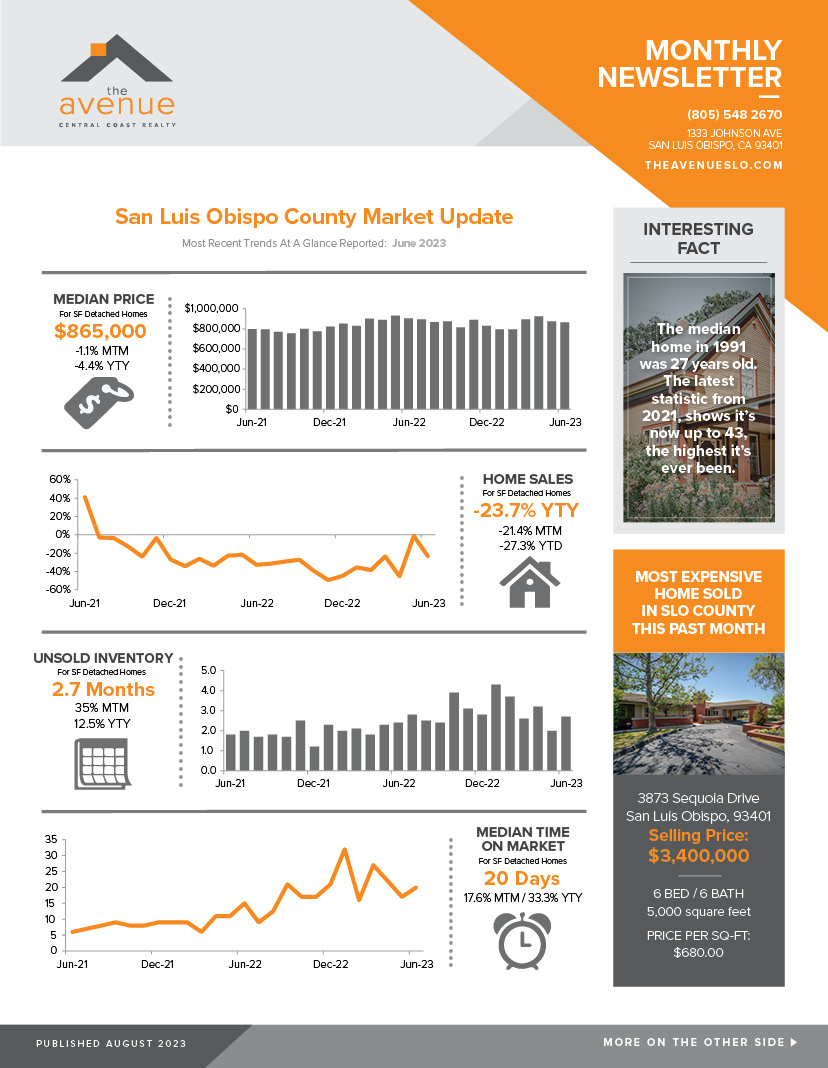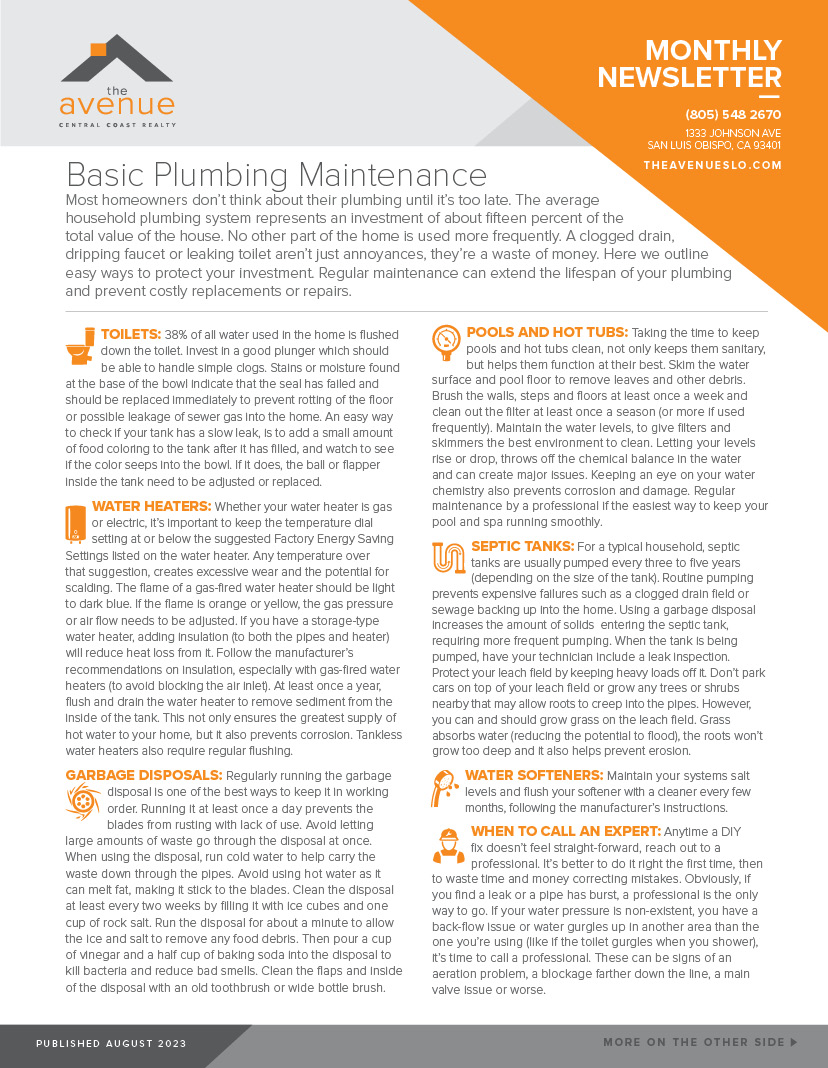The Avenue AUGUST 2023 Real Estate Newsletter
SLO County Market Update & great read on “Basic Plumbing Maintenance”
*INTERESTING FACT –
The median home in 1991 was 27 years old. The latest statistic from 2021, shows it’s now up to 43, the highest it’s ever been.
Basic Plumbing Maintenance
Most homeowners don’t think about their plumbing until it’s too late. The average household plumbing system represents an investment of about fifteen percent of the total value of the house. No other part of the home is used more frequently. A clogged drain, dripping faucet or leaking toilet aren’t just annoyances, they’re a waste of money. Here we outline easy ways to protect your investment. Regular maintenance can extend the lifespan of your plumbing and prevent costly replacements or repairs.
Toilets:
38% of all water used in the home is flushed down the toilet. Invest in a good plunger which should be able to handle simple clogs. Stains or moisture found at the base of the bowl indicate that the seal has failed and should be replaced immediately to prevent rotting of the floor or possible leakage of sewer gas into the home. An easy way to check if your tank has a slow leak, is to add a small amount of food coloring to the tank after it has filled, and watch to see if the color seeps into the bowl. If it does, the ball or flapper inside the tank need to be adjusted or replaced.
Water Heaters:
Whether your water heater is gas or electric, it’s important to keep the temperature dial setting at or below the suggested Factory Energy Saving Settings listed on the water heater. Any temperature over that suggestion, creates excessive wear and the potential for scalding. The flame of a gas-fired water heater should be light to dark blue. If the flame is orange or yellow, the gas pressure or air flow needs to be adjusted. If you have a storage-type water heater, adding insulation (to both the pipes and heater) will reduce heat loss from it. Follow the manufacturer’s recommendations on insulation, especially with gas-fired water heaters (to avoid blocking the air inlet). At least once a year, flush and drain the water heater to remove sediment from the inside of the tank. This not only ensures the greatest supply of hot water to your home, but it also prevents corrosion. Tankless water heaters also require regular flushing.
Garbage Disposals:
Regularly running the garbage disposal is one of the best ways to keep it in working order. Running it at least once a day prevents the blades from rusting with lack of use. Avoid letting large amounts of waste go through the disposal at once. When using the disposal, run cold water to help carry the waste down through the pipes. Avoid using hot water as it can melt fat, making it stick to the blades. Clean the disposal at least every two weeks by filling it with ice cubes and one cup of rock salt. Run the disposal for about a minute to allow the ice and salt to remove any food debris. Then pour a cup of vinegar and a half cup of baking soda into the disposal to kill bacteria and reduce bad smells. Clean the flaps and inside of the disposal with an old toothbrush or wide bottle brush.
Pools and Hot Tubs:
Taking the time to keep pools and hot tubs clean, not only keeps them sanitary, but helps them function at their best. Skim the water surface and pool floor to remove leaves and other debris. Brush the walls, steps and floors at least once a week and clean out the filter at least once a season (or more if used frequently). Maintain the water levels, to give filters and skimmers the best environment to clean. Letting your levels rise or drop, throws off the chemical balance in the water and can create major issues. Keeping an eye on your water chemistry also prevents corrosion and damage. Regular maintenance by a professional if the easiest way to keep your pool and spa running smoothly.
Septic Tanks:
For a typical household, septic tanks are usually pumped every three to five years (depending on the size of the tank). Routine pumping prevents expensive failures such as a clogged drain field or sewage backing up into the home. Using a garbage disposal increases the amount of solidsentering the septic tank, requiring more frequent pumping. When the tank is being pumped, have your technician include a leak inspection. Protect your leach field by keeping heavy loads off it. Don’t park cars on top of your leach field or grow any trees or shrubs nearby that may allow roots to creep into the pipes. However, you can and should grow grass on the leach field. Grass absorbs water (reducing the potential to flood), the roots won’t grow too deep and it also helps prevent erosion.
Water Softeners:
Maintain your systems salt levels and flush your softener with a cleaner every few months, following the manufacturer’s instructions.
When to Call an Expert:
Anytime a DIY fix doesn’t feel straight-forward, reach out to a professional. It’s better to do it right the first time, then to waste time and money correcting mistakes. Obviously, if you find a leak or a pipe has burst, a professional is the only way to go. If your water pressure is non-existent, you have a back-flow issue or water gurgles up in another area than the one you’re using (like if the toilet gurgles when you shower), it’s time to call a professional. These can be signs of an aeration problem, a blockage farther down the line, a main valve issue or worse.




